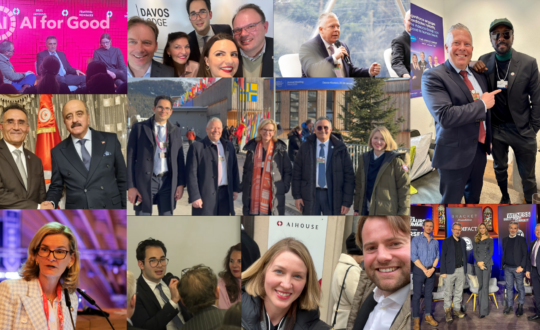Discover the full AI Governance Day 2024 Report – From Principles to Implementation here.
Panelists:
- H.E. Ms. Emma Inamutila Theofelus, Minister Ministry of Information and Communication Technology, Namibia
- Mercedes Aramendia Falco, President, Directorio Unidad Reguladora de Servicios de Comunicaciones (URSEC), Uruguay
- Niraj Verma, Additional Secretary Department of Telecommunications, Government of India
Moderator:
- Robert F. Trager, Professor, University of Oxford.
This panel discussion underscored the multifaceted nature of AI governance. While the benefits of AI in sectors like healthcare, education, and finance are immense, the associated risks, particularly in cybersecurity and data privacy, require careful management. A collaborative approach, rooted in international standards and adapted to local contexts, appears to be the most promising path forward. As nations like Namibia, Uruguay, and India continue to navigate this complex landscape, their experiences and strategies offer lessons for the global community.
Namibia: leveraging AI for development and addressing cyberthreats
Her Excellency Ms. Minister Emma Inamutila Theofelus emphasized the dual nature of AI as both a potential boon and a threat.
Namibia’s challenge is providing services across vast distances in a sparsely populated country – only 3 million people spread over 825,000 square kilometers [Editor: about twice the area of California].
Ms. Theofelus pointed to healthcare as a sector where AI can make a substantial impact. By analyzing data from censuses and routine data collection, AI can help prioritize the placement of healthcare facilities, such as dialysis centers and cancer wards, where they are most needed. This data-driven approach can save lives, optimize investments, and ensure the healthcare system operates efficiently. In education, AI could bridge the gap between current skills and future industry demands by forecasting which skills will be needed and training students accordingly.
However, Ms. Theofelus also noted the risks associated with AI, particularly in the realm of cybersecurity. Namibia experiences around 2.7 million cyber attacks, especially in the financial sector. She stressed the need for increased digital literacy among citizens to protect themselves online.
“We cannot reach every single person because there are barriers in terms of distance [and] barriers in terms of rolling out facilities for them to get trained.” (Emma Inamutila Theofelus)
AI could help overcome these barriers by providing personalized training programs in local languages.
On the importance of international governance frameworks and collaborative efforts to address the global nature of AI challenges, Ms. Theofelus advocated for a unified approach, emphasizing that disparate frameworks can be confusing and counterproductive. She stressed the need for consensus on common principles and values that can be adapted to the specific contexts of different countries.
“We want to see there to be some consensus around a governance framework that would work for the majority […] there must be a way in which we can all come to common grounds and once we take that approach I think it becomes easier for national states and national governments to look at the governance framework and tailor it to their own country.” (Emma Inamutila Theofelus)

H.E. Ms. Emma Inamutila Theofelus, Minister of Information and Communication Technology, Namibia
Uruguay: national strategies and ethical frameworks
Ms. Mercedes Aramendia Falco discussed Uruguay’s comprehensive approach to AI governance, rooted in national and international standards. Uruguay’s National AI Strategy, initially established in 2020, was updated in 2021 to align with UNESCO’s recommendations, ensuring transparency, accountability, and ethical implementation.
“We have a national strategy for AI which dates from 2020. In 2021, following the recommendations of UNESCO, we understood the need to update that strategy on AI.” (Mercedes Aramendia Falco)
Uruguay’s approach involves collaboration across the entire ecosystem, including public and private sectors, to develop an inclusive and effective strategy.
One of Uruguay’s key initiatives is the Ceibal Plan, launched in 2007, which aims to universalize access to education by providing internet and laptops to all public school students. This plan has evolved to incorporate AI, ensuring that students not only have access to technology but also understand how to use it and the associated risks.
“We cannot just have one concrete action, we need many parallel activities to ensure that AI has a positive impact and to ensure that students can access internet and be connected. We are analyzing data to do so [and] we are using AI [for it].” (Mercedes Aramendia Falco)
Despite the benefits, Ms. Falco acknowledged the risks, particularly concerning data privacy and security. She emphasized the importance of maintaining transparency and control over algorithms to prevent misuse of data. In sectors like finance and healthcare, where AI can drive significant improvements, safeguarding sensitive information and ensuring ethical use are paramount.
On the importance of collaboration towards international frameworks, Ms. Falco noted that Uruguay’s updated national strategy on AI is aligned with international standards to ensure a cohesive approach. She emphasized the need for ongoing assessment and collaboration with various stakeholders, including the private sector, to develop talent and build capacity, highlighting Uruguay’s efforts to incorporate diverse perspectives in shaping AI governance.
“Following UNESCO’s recommendations, we have started a brand new process: we have approved a national law in which a national agency […] has been set up, which has created a new strategy which incorporates the international standards. The public and private sectors participate in this in this strategy” (Mercedes Aramendia Falco)

Mercedes Aramendia Falco, President, Directorio Unidad Reguladora de Servicios de Comunicaciones (URSEC), Uruguay
India: harnessing AI for economic growth and combating cybercrime
Mr. Niraj Verma highlighted AI’s potential to boost India’s GDP significantly. A recent study suggests that AI could contribute between $360 billion and $460 billion to India’s GDP by 2030. Additional Secretary Verma pointed to the success of India’s Unified Payments Interface (UPI) system, which processed approximately 300 billion transactions worth $2 trillion last year.
However, Mr. Verma also highlighted the dark side of AI, particularly the rise in cyber attacks and cyber crimes. The Department of Telecommunications has taken proactive steps, such as launching the Sanchar Saathi portal to combat these threats.
“In the last 3 to 4 months, we have disconnected 6 million SIM cards because of cyberattacks.” (Niraj Verma)

Niraj Verma, Additional Secretary Department of Telecommunications, Government of India
The role of AI safety institutes
The idea of AI safety institutes was another key topic of discussion. These institutes aim to create a network for monitoring and mitigating the risks associated with AI deployment. While the concept is appealing, the implementation may vary based on a country’s resources and existing infrastructure.
Ms. Falco highlighted the importance of standards and guidelines in ensuring the safe and ethical use of AI.
“Standards help us to be able to regulate, that’s the work of policy makers in general, and companies when they develop their own standards, […] have references, guidelines which help them go down the right line. That just simplifies everyone’s work […] and then we can bring in the participation of tech technicians experts and other stakeholders in the ecosystem so that we can best […] create clear rules.” (Mercedes Aramendia Falco)
Uruguay’s approach involves incorporating these standards into national policies and collaborating with international bodies to maintain a balance between innovation and risk management.
Ms. Theofelus offered a thought-provoking perspective on the terminology used, suggesting a more positive framing might be beneficial. For countries like Namibia, with limited resources, integrating AI safety functions into existing institutions could be a more feasible approach.
“Just even the wording ‘AI safety institute’ already presumes that there’s some threat, as opposed to looking at the positive side of things.” (Emma Inamutila Theofelus)
Mr. Verma supported the idea of AI safety institutes, particularly for a large and diverse country like India. He emphasized the role these institutes could play in providing safeguards and setting standards that startups and other entities could follow.
“It is a good idea to have an AI safety institute […]. In my country there are a lot of startups and there would be some guidelines [and standards] to follow.” (Niraj Verma)

Robert F. Trager, Professor, University of Oxford


 Register here
Register here












